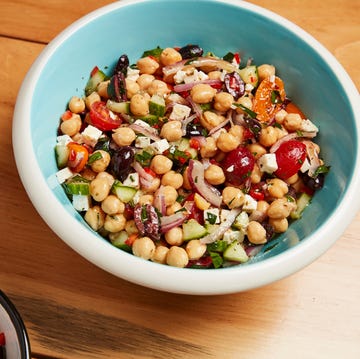No matter who you are or where you run, it's important to have an understanding of your sweat rate. Knowing how much sweat you lose during the course of a run will help you rehydrate properly so you can perform your best.
The Sweat Test
- Weigh yourself nude right before a run.
- Run at race pace for one hour, keeping track of how much you drink (in ounces) during the run.
- After the run, strip down, towel off any sweat, and weigh yourself nude again.
- Subtract your weight from your prerun weight and convert to ounces. Then add to that number however many ounces of liquid you consumed on your run. (For example, if you lost a pound and drank 16 ounces of fluid, your total fluid loss is 32 ounces.)
- To determine how much you should be drinking about every 15 minutes, divide your hourly fluid loss by 4 (in the above example it would be 8 ounces).
- Because the test only determines your sweat losses for the environmental conditions you run in that day, you should retest on another day when conditions are different to see how your sweat rate is affected. You should also redo the test during different seasons, in different environments (such as higher or lower altitudes), and as you become faster, since pace also affects your sweat rate.
Hydration Chart by Weight
For runners who love numbers, the new hydration recommendation to drink when thirsty is too simple. So we've created our own Healthy Hydration Guidelines for Runners. We devised these guidelines from a review of medical studies on runners and their sweat rates, and from sweat-rate testing conducted on our own staff at Runner's World. These guidelines are not designed to replace all the fluid you lose while running, but most of it. And as with any guidelines, ours will not work for all runners, so follow at your own risk. It's still important to weigh yourself before and after workouts to see if you are losing or gaining weight. If so, adjust your drinking accordingly. Below are some numbers that will show you the amount of fluid you should consume for each mile you run.
Weight 100
Fluid Ounces Per Mile Depending On The Temperature:
50°F: 3.0
60°F: 3.2
70°F: 3.3
80°F: 3.6
90°F: 4.1
100°F: 4.7
Weight 120
Fluid Ounces Per Mile Depending On The Temperature:
50°F: 3.6
60°F: 3.8
70°F: 4.0
80°F: 4.3
90°F: 4.9
100°F: 5.6
Weight 140
Fluid Ounces Per Mile Depending On The Temperature:
50°F: 4.2
60°F: 4.4
70°F: 4.6
80°F: 5.0
90°F: 5.7
100°F: 6.5
Weight 160
Fluid Ounces Per Mile Depending On The Temperature:
50°F: 4.8
60°F: 5.0
70°F: 5.3
80°F: 5.8
90°F: 6.5
100°F: 7.4
Weight 180
Fluid Ounces Per Mile Depending On The Temperature:
50°F: 5.4
60°F: 5.7
70°F: 5.9
80°F: 6.5
90°F: 7.3
100°F: 8.4
Weight 200
Fluid Ounces Per Mile Depending On The Temperature:
50°F: 6.0
60°F: 6.3
70°F: 6.6
80°F: 7.2
90°F: 8.1
100°F: 9.3
Weight 220
Fluid Ounces Per Mile Depending On The Temperature:
50°F: 6.6
60°F: 6.9
70°F: 7.3
80°F: 7.9
90°F: 8.9
100°F: 10.2
Weight 240
Fluid Ounces Per Mile Depending On The Temperature:
50°F: 7.2
60°F: 7.6
70°F: 7.9
80°F: 8.6
90°F: 9.7
100°F: 11.2













